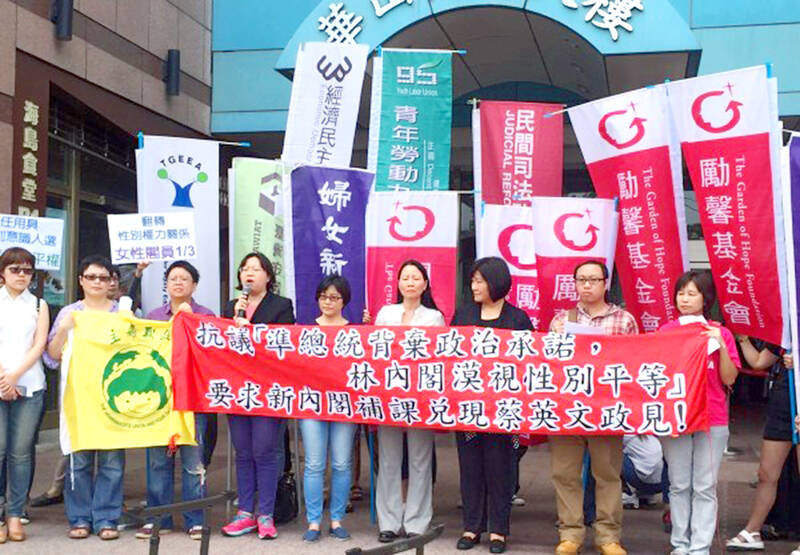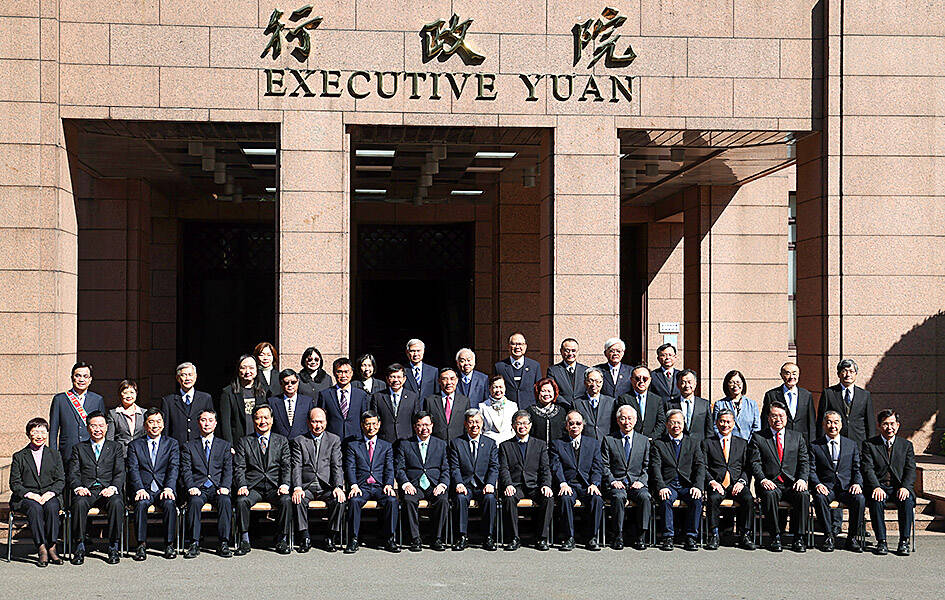The government recently touted its new 16.7 percent female cabinet as a major achievement in gender equality, but the numbers can be deceiving.
Yes, it’s a marked increase from the previous cabinet, which at 7.5 percent female made up the least inclusive cabinet since 1990. This number was even lower at 4.76 percent in 2020, which is only better than the Martial Law era when zero women served.
What the reports don’t mention is that this number exceeded 20 percent several times during both the Chen Shui-bian (陳水扁) and Ma Ying-jeou (馬英九) eras, but it has so far never met the Executive Yuan Gender Equality Policy Guidelines (行政院性別平等政策綱領) of 33 percent.

Photo: Chen Hui-ping, Taipei Times
Awakening Foundation (婦女新知基金會) Secretary-General Chyn Yu-rung (覃玉蓉) tells the Taipei Times that the notion of progress really depends on who is being compared with and which data sets are referenced.
For example, Chyn says that an often-mentioned statistic is the percentage of women in Taiwan’s legislature, which at 42.5 percent is the highest in Asia.
“But those who are familiar with Taiwanese politics know that when the ruling party holds a majority in the legislature, cabinet members hold comparatively more power,” Chyn says regarding her group’s long-time emphasis on cabinet diversity. “It feels that because we already have a female president, there’s no more problems with female participation in politics. But we see a huge problem.”

Photo: CNA
Of course there has been progress, but Chyn says that painting an overly rosy picture will create an illusion that Taiwan is already gender-equal, and people no longer need to push the government to do better.
“[W]e need to keep identifying areas that are still lacking and figure out how to improve them,” she says.
It’s true that the number of local government heads in Taiwan that are women reached a historic high of 56.3 percent after the local elections late last year, but Chyn says that is the result of election strategy. Usually, the opposition party fields more female candidates — this time, the Chinese Nationalist Party (KMT) nominated twice the number of women than the Democratic Progressive Party (DPP) — winning big and boosting female representation.
But the Awakening Foundation is more concerned about “local cabinets” (小內閣), referring to the various department heads and leaders within each city or county government. No regions reached the foundation’s targeted 40 percent female rate, with Penghu County coming closest at 38.9 percent.
“We’ve noticed that many of these local heads are later nominated as party candidates or are promoted to positions in the central government,” Chyn says. “It’s very beneficial for one’s political career. We’ve heard officials say that they can’t find any women to nominate — that’s because you’re not cultivating the talent from the local level.”
WAGE GAP
The widening gender wage gap is also concerning for the foundation. After steadily declining for the past decade, the gender wage gap has increased, rising from 14.8 percent in 2020 to 15.8 percent in 2021.
Media and government reports often point out that Taiwan’s pay disparity is better than that of Japan (21.1), South Korea (31.1)* and the US (16.9). Chyn says that those countries are known for their poor performances in that area, and Taiwan should not be measuring itself against them. Instead, it should look at EU countries such as Luxembourg so it can continue to improve.
In fact, Japan ranked 116 out of 146 in last year’s Global Gender Gap Report, which is hardly a good measuring stick.
Other issues such as women receiving less pension than men and female workers being threatened when trying to take parental leave are harder to quantify due to the lack of specific data, Chyn says.
She says that on the surface, it seems that Taiwan’s women can return to work without problems after taking maternity leave. But the foundation still gets many calls from concerned women — some even getting fired.
“The ones who actually take the leave are the ones who have supportive bosses,” she says. “But there are many who need it and aren’t able to. These people do not show up in the data. To truly improve policy, we need to go deeper and interview those having issues to clearly show that there is a problem.”
* An earlier version of this story gave incorrect figures for Japan and South Korea.

Google unveiled an artificial intelligence tool Wednesday that its scientists said would help unravel the mysteries of the human genome — and could one day lead to new treatments for diseases. The deep learning model AlphaGenome was hailed by outside researchers as a “breakthrough” that would let scientists study and even simulate the roots of difficult-to-treat genetic diseases. While the first complete map of the human genome in 2003 “gave us the book of life, reading it remained a challenge,” Pushmeet Kohli, vice president of research at Google DeepMind, told journalists. “We have the text,” he said, which is a sequence of

On a harsh winter afternoon last month, 2,000 protesters marched and chanted slogans such as “CCP out” and “Korea for Koreans” in Seoul’s popular Gangnam District. Participants — mostly students — wore caps printed with the Chinese characters for “exterminate communism” (滅共) and held banners reading “Heaven will destroy the Chinese Communist Party” (天滅中共). During the march, Park Jun-young, the leader of the protest organizer “Free University,” a conservative youth movement, who was on a hunger strike, collapsed after delivering a speech in sub-zero temperatures and was later hospitalized. Several protesters shaved their heads at the end of the demonstration. A

Every now and then, even hardcore hikers like to sleep in, leave the heavy gear at home and just enjoy a relaxed half-day stroll in the mountains: no cold, no steep uphills, no pressure to walk a certain distance in a day. In the winter, the mild climate and lower elevations of the forests in Taiwan’s far south offer a number of easy escapes like this. A prime example is the river above Mudan Reservoir (牡丹水庫): with shallow water, gentle current, abundant wildlife and a complete lack of tourists, this walk is accessible to nearly everyone but still feels quite remote.

In August of 1949 American journalist Darrell Berrigan toured occupied Formosa and on Aug. 13 published “Should We Grab Formosa?” in the Saturday Evening Post. Berrigan, cataloguing the numerous horrors of corruption and looting the occupying Republic of China (ROC) was inflicting on the locals, advocated outright annexation of Taiwan by the US. He contended the islanders would welcome that. Berrigan also observed that the islanders were planning another revolt, and wrote of their “island nationalism.” The US position on Taiwan was well known there, and islanders, he said, had told him of US official statements that Taiwan had not